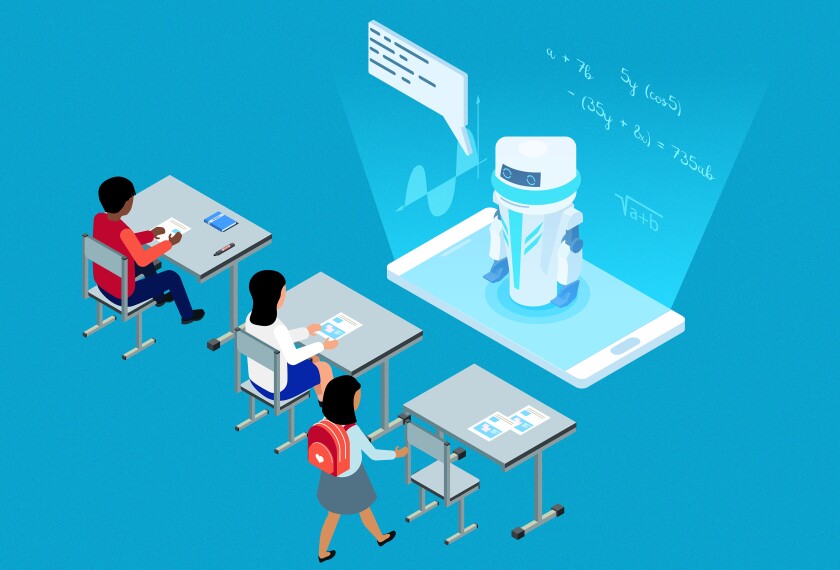Even though it’s been a year and a half since ChatGPT was released, making terms like “generative AI” a mainstay in education conversations, most teachers report that they are not using AI for teaching, according to a new survey by RAND.
There are, however, some trends emerging among the teachers who are adopting the technology. Among those most likely to be using AI: Social studies and English/language arts teachers.
RAND surveyed a nationally representative sample of 1,020 teachers and district leaders from a nationally representative sample of 231 school districts in the fall of 2023. Additionally, RAND interviewed 11 leaders from those districts. The survey used a broad definition of AI, including virtual learning platforms that use AI, adaptive learning software, virtual assistants, and chatbots.
Overall, 18 percent of teachers said they are regularly using AI-powered tools in their teaching, while an additional 15 percent have tried AI technologies but don’t use them regularly in their work. That means two-thirds of teachers are not using AI at all, according to the RAND study.
An EdWeek Research Center survey of teachers from December found nearly identical results: Two-thirds of teachers said they are not currently using AI-powered tools in their classrooms, although in that survey, 29 percent said they plan to use AI in the near future.
But Sy Doan, a policy researcher at RAND and one of the authors of the report, said that AI use may be higher than these survey results show: teachers may not be aware that software like Google Classrooms and Khan Academy have features that use AI.
Among social studies and English/language arts teachers, the number of AI users was higher than the general teaching population. Twenty-seven percent of English teachers and social studies teachers use AI tools in their work. By comparison, 19 percent of teachers in STEM disciplines said they use AI, and 11 percent of elementary education teachers reported doing so.
The reason? The report’s authors suspect it’s because English/language arts and social studies teachers are more likely to supplement or create their own instructional materials, which prior research has found. In the case of social studies teachers, the report said they receive less guidance from their schools than teachers of core academic subjects do.
But it may be that teachers in other subjects are simply not aware that they’re using AI-powered tools, said Doan.
“There could be existing tools for STEM teachers out there that ... already have AI embedded in them, but teachers may not be aware that the things that they’re using are powered by AI,” he said. “So, there’s that potential out there too.”
Middle and high school teachers were more likely to regularly use AI tools than their counterparts in elementary schools. In the open-ended comments on the survey, Doan said, several elementary teachers said they didn’t think AI-powered tools were age-appropriate for use in the elementary classroom.
Study identifies most common AI tools teachers are using
What surprised researchers at RAND was that there were not significant differences in AI use between teachers from high-income and low-income schools or by teachers based on their years of experience. It’s hard, though, to draw too many conclusions from these data as the number of teachers using AI is small and becomes less representative as it’s divided into smaller subgroups.
However, districts serving majorities of white students were more likely to say they had provided teachers with training on how to use AI for instructional purposes: 27 percent of those districts reported doing so, compared with 11 percent of districts serving mostly students of color.
Teachers in suburban schools were a little more likely to say they use AI than teachers in rural and urban schools—21 percent in suburban schools compared with 16 percent in rural schools and 17 percent in urban schools.
The RAND study found that the most common AI tools teachers are using are virtual learning platforms like Google Classroom, adaptive learning systems like Khan Academy, and chatbots like ChatGPT and Google’s Gemini. Teachers say they are most often using AI technologies to adapt instructional content to match their students’ academic abilities and to generate classroom materials.
Here, another interesting difference emerged, said Doan. The survey asked teachers if they used AI to generate quizzes, assignments, and worksheets.
“About 41 percent among all teachers who said they were using AI said they were using it for this purpose. But we found that this rate was actually significantly higher among teachers in higher poverty schools,” he said.
Doan said that tracks with other research that finds teachers in higher poverty schools often must seek out resources beyond what their districts and schools provide.
“Teachers in higher poverty schools may be reaching out to things like ChatGPT now in order to generate those supplemental materials,” he said. “Our take on that is that it’s not necessarily a bad thing, but a lot of these outputs are unverified and there is no way to tell whether or not they are aligned to academic standards or have any of the qualities we would associate with high quality instructional materials.”
He said the quality of the content AI is producing is an area where district leaders should be focusing more attention.
Among the top AI use barriers for teachers who are not currently using the technology are concerns about the role of artificial intelligence in society, concerns about data privacy, lack of professional development, and lack of guidance from the school district on how to use AI tools and products. Many current AI users cited these as tops concerns to their continued use of AI tools as well.







